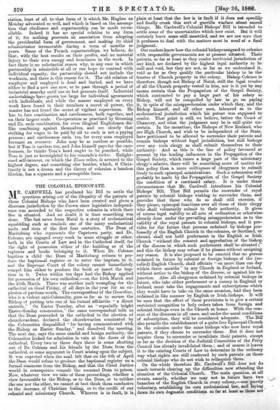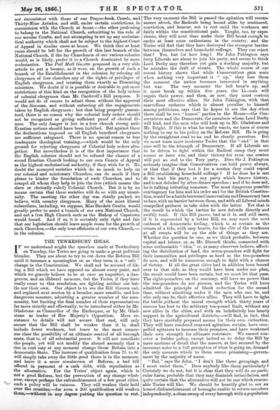THE COLONIAL EPISCOPATE.
MR. CARDWELL has produced his Bill to settle the questions arising out of the illegality of the patents of those Colonial Bishops who have been created and given a diocesan jurisdiction by the Crown since legislative independ- ence was. accorded to the respective colonies in which their See is situated. And no doubt it is time something was done. The last news from Natal is a story of ecclesiastical squabbling such as reminds one of the many ecclesiastical mobs and riots of the first four centuries. The Dean of Maritzburg who represents the Capetown party, and Dr. Colenso, are engaged every week in some struggle or other, both in the Courts of Law and in the Cathedral itself, for the right of possession either of the building or of the registers and books belonging to it. When Dr. Colenso baptizes a child the Dean of Maritzburg refuses to pro- duce the baptismal register or to enter the baptism in it, and the Supreme Court of the colony cannot immediately compel him either to produce the book or insert the bap- tism in it. Twice within ten days had the Bishop applied for possession of his own cathedral,—on the 15th March and the 25th March. There was another such wrangling for the cathedral on Good Friday, of all days in the year for an ex- plosion of partizan wrath. The correspondent of the Guardian, who is a violent anti-Colensoite, goes so far as to accuse the Bishop of putting into one of his formal affidavits "a direct untruth." On Easter Tuesday, after an "especially bright Easter-Sunday communion," the same correspondent tells us that the Dean proceeded in the cathedral to the election of churchwardens, declared the churchwarden nominated by the Colensoites disqualified "for having communicated with the Bishop on Easter Sunday," and dissolved the meeting. The next day, says the same candid and benign authority, the Colensoites kicked for admission in vain at the doors of the cathedral. Every two or three days there is some shutting out of Dr. Colenso and his friends by the Dean from the cathedral, or some argument in Court arising upon the subject. It was expected when the mail left that on the 6th of April the Dean would refuse to produce the baptismal register on a formal summons from the Bishop, and that the Chief Justice would in consequence commit the recusant Dean to prison. Now, whatever view we take of these proceedings, whether a view favourable to the Bishop, or to the Dean, or to neither the one nor the other, we cannot at best think them conducive to the increase of Christian feeling, or to the credit of our colonial and missionary Church. Whoever is in fault, it is plain at least that the law is in fault if it does not speedily and finally crush this sort of guerilla warfare about sacred things. Mr. Cardwell's Colonial Bishops' Bill is intended to settle some of the uncertainties which now exist. Alt it will certainly leave some still unsettled, and we are not sure- that it professes to deal with the matters most in need of a Bear judgment.
Our readers know how the colonial bishops assignett to colonies. with responsible governments are at present situated. Their.
patents, so far at least as they confer territorial jurisdiction of any kind, are declared by the highest legal authority to be null and void, but they are not, as far as we understand it, void so far as they qualify the particular bishop to be the trustee of Church property in the colony. Bishop Colenso is therefore, though not Bishop of Natal, still the legal trustee.
of all the Church property vested in him, nor is it yet by any means certain that the Propagation of the Gospel Society, which contracted to pay a large part of his salary as Bishop, will not be compelled by law to go on paying it, in spite of the misapprehension under which they, and the- Bishop himself, and all other men, laboured as to the ecclesiastical jurisdiction which his patent was supposed to confer. That point is still, we believe, before the Court of Chancery, and what the judgment may be is still quite un- certain. In the meantime, the Bishops of New Zealand, who. are High Church, and wish to be independent of the State, have petitioned to be allowed to surrender their patents and remain bishops without legal jurisdiction, but still bishops over any such clergy as shall submit themselves to their authority. And as this is the line of policy favoured at present by the leading influences in the Propagation of the Gospel Society, which raises a large part of the missionary clergy's salaries, there will be something more of motive for this policy than a mere willingness of clergymen to submit freely to such episcopal ministrations. Such a submission will probably be made by the Propagation of the Gospel Society- the condition of a continued salary. It is under these- circumstances that Mr. Cardwell introduces his Colonial Bishops' Bill. That Bill permits the surrender of royal patents by colonial bishops wishing to surrender them, and provides that those who do so shall still exercise, if they please, episcopal functions over all those of their clergy who shall voluntarily submit to their authority. It gives of coarse legal validity to all acts of ordination or otherwise' already done under the prevailing misapprehension as to the validity of the royal patents to colonial bishops, and it pro- vides for the future that persons ordained by bishops pro- fessedly of the English Church in the colonies, or Scotland, or abroad, shall not hold preferment in the English or Irish Church "without the consent and approbation of the bishop. of the diocese in which such preferment shall be situated ;" and this the bishop may refuse if he pleases without assigning any reason. It is also proposed to be enacted that no person ordained in future by colonial or foreign bishops of the (so— called) English Church, shall officiate "on more than one day within three months" in any Church in England or Ireland, without notice to the bishop of the diocese, or against his in- junction. Also all clergymen ordained by colonial bishops in future, who take either preferment or a curacy in England or Ireland, must take the engagements and subscriptions which they would have to take on the same occasion, had they been ordained in like manner by English or Irish.bishops. It will be seen that the effect of these provisions is to give a certain restricted recognition to holy orders taken from foreign and colonial bishops even in the Church at home. With the con- sent of the diocesan in all cases, and under the usual conditions of subscription, they will be considered adequate. The Bill also permits the establishment of a quite free Episcopal Church in the colonies under the same bishops who now have royal patents, if they choose to surrender them. But it does not require them to surrender or invalidate their patents, except so far as the decision of the Judicial Committee of the Privy Council has already invalidated them ; and of course it leaves. it to the existing Courts of Law to determine in the ordinary way what rights are still conferred by such patents on those colonial bishops who do not wish to relinquish them. On the whole therefore Mr. Cardwell's Bill does not do much towards clearing _up the difficulties now attending the situation of the Colonial Church. The main question, at all events, namely, whether we may not in future have two branches of the English Church in every colony,—one purely voluntary, establishing its own ecclesiastical law, and laying . down its own dogmatic conditions so far at least as these are not inconsistent with those of our Prayer-book, Creeds, and Thirty-Nine Articles, and still, under certain restrictions, in communion with the Church at home.—the other professing to belong to the National Church, submitting to the rule of our secular Coutts, and not attempting to set up any ecclesias- tical authority which shall not be subject to the highest Court of Appeal in similar cases at home. We think that at least room should be left for the growth of this last branch of the National Church, if the lay Churchmen of our various colonies would, as is likely, prefer it to a Church dominated by mere ecclesiastics. The Pall Mall Gazette proposed in a very able article to put a bounty, as it were, on the growth of such a branch of the Establishment in the colonies, by refusing all clergymen of free churches any of the rights or privileges of English clergymen, and treating them exactly as Dissenting ministers. We doubt if it is possible or desirable to put more restrictions of this kind on the recognition of the holy orders of colonial clergymen than Mr. Cardwell's Bill proposes. It would not do of course to admit them without the approval of the diocesan, and without enforcing all the engagements taken by English clergymen ; but that being properly guaran- teed, there is no reason why the colonial holy orders should not be recognized as giving sufficient proof of clerical fit- ness. The only danger is lest in a free church strong anti- Erastian notions should have been imbibed. But against these the declarations imposed on all English beneficed clergymen are sufficient safeguard. There is no special reason to fear inadequate theological training,—which would be the only ground for rejecting clergymen of Colonial holy orders alto- gether. But nevertheless it is of the first importance that the English colonies should not be refused the chance of a sound Erastian Church looking to our own Courts of Appeal as the highest ecclesiastical authority, if they wish for it. No doubt the moneyed societies which do so much to help on our colonial and missionary Churches, can do much if they please to hinder the foundation of such Churches, and to compel all whom they help to join the free (which means the slave or clerically ruled) Colonial Church. But it is by no means certain that these societies will do so with any unani- mity. The meeting the other day was chiefly packed, we believe, with country clergymen. Many of the most liberal subscribers, including, we suppose, Miss Burdett Coutts, would greatly prefer to assist a branch of our own National Church, and not a free High Church such as the Bishop of Capetow-n would found. And if so, it is certainly only right and fair that our legislation should leave ample room for the growth of such Churches,—the only true offshoots of our own Church,— in the colonies.































 Previous page
Previous page